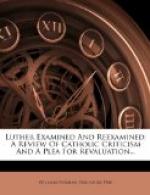No character-study is just that fails to take into consideration the force of circumstances under which the subject of the study has acted at a given moment in his life. In the case of Luther there is a more than ordinary necessity for adopting this equitable method; for Luther has declared hundreds of times that his stirring utterances and incisive deeds were not the result of long premeditation, or the sudden outbursts of uncontrolled passion,—though neither he nor we would have any interest in denying that he could be angry and did become angry,—but the answer to crying needs of the times. This answer was on many a signal occasion wrung from Luther after much wrestling with God in prayer. He was moved to action by the heroism of that faith which had been kindled in him. He acted in harmony with the particular issue with which he was called upon to deal. Deep compassion at the sight of his suffering fellow-men put strong language on his lips. Between the pleading of friends and the storming of enemies he had no choice but to act as he did. Luther often seems unconscious of the greatness of his acts: he speaks of them as “his poor way of doing things,” and invites others to improve what he has attempted. We fear that many in our day fail to see the greatness of the achievement while they stricture the manner of achieving it.
Few men have so utterly lived for a cause, in a cause, and with a cause as Luther. It is the heart of an entire people that cries out through Luther; it is the soul of outraged Christianity that moans in anguish, and speaks with the majesty of righteous anger through Luther. An age of unparalleled ferment that had begun long before Luther has reached its culminating point, and lifts up its strident voice of long-restrained expostulation through Luther. Remove the conditions under which Luther had to live and labor, and the Luther whom men bless or curse becomes an impossibility.
In Luther’s life-work there is discernible the influence not only of good men, such as the scholarly Melanchthon, the faithful Jonas, the firm and kind Saxon electors, the eager Amsdorf, the alert Link, but also of evil men like the blunt Tetzel, the wily Prierias, and the horde of ignorant monks which the monasteries and chancelleries of Rome let loose upon one man. The course which Luther had to pursue was shaped for him by others. We do not mean to suggest that Luther in his polemical writings employed the cheap method of replying to the coarse language adopted by his opponents in similar language; but it is fair to him that this fact be recorded. Some people remember very well that Luther addressed the Pope “Most hellish father!” and are horrified, but they forget that the Pope had been extremely lurid in the appellatives which he applied to Luther. “Child of Belial,” “son of perdition,” were some of the endearing terms with which Luther was to be assured of the loving interest the Holy Father took in him. That Luther called Henry VIII




